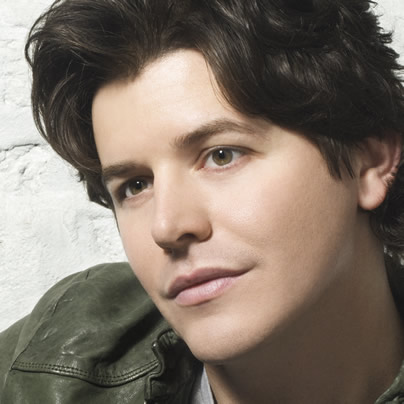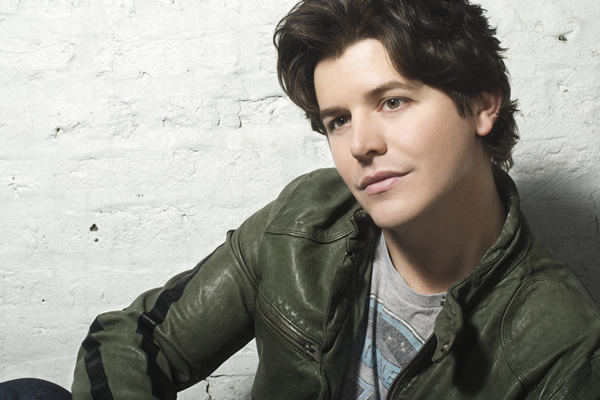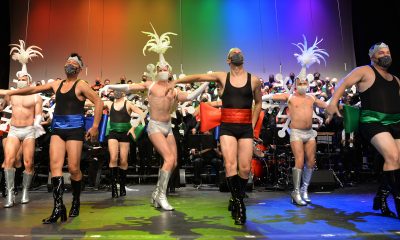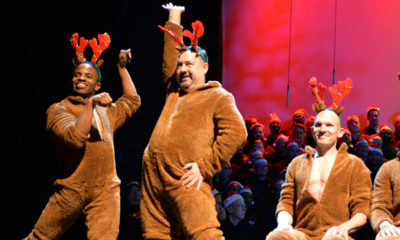Arts & Entertainment
Revisiting ‘Les Mis’
Anniversary touring production in town just before film opens

‘Les Miserables’
Through Dec. 30
The National Theater
1321 Pennsylvania Ave., NW
$40-$118
800-447-7400

Actor Jason Forbach met his boyfriend at auditions for the current touring production of ‘Les Miserables.’ They’re both in the show.
With the hotly anticipated film version of “Les Misérables” poised to open on Christmas day, it’s an exciting time to be connected to the musical.
“For me, just being in ‘Les Mis’ is a dream come true but to be in it right now is almost overwhelming,” says gay actor Jason Forbach, a cast member in the show’s 25th anniversary tour production currently playing at National Theatre. “It feels like a perfect moment in time.”
Forbach plays Enjolras, the iconic young revolutionary who leads the students in an ardent but unsuccessful anti-monarchist uprising. In Victor Hugo’s epic novel (on which the show is based), Enjolras is described as angelically beautiful. “No pressure there,” quips handsome Forbach before rhapsodizing on his character’s other admirable qualities: “I’m in love with this guy. He’s a passionate idealist who dies for what he believes in. Trying to grasp on to that magic is a challenge. It’s the most important role I’ve ever played.”
Set against the political conflicts of early 19th century Paris, “Les Misérables” follows the travails of Jean Valjean, an honest French peasant who spends almost 20 years in prison for stealing a loaf of bread to feed his starving family. After his release he breaks parole and attempts to make a fresh start under an assumed identity, but Valjean’s attempts to separate from the past are thwarted by police inspector Javert who remains doggedly on his trail. Hugo’s material translates into powerful and uplifting theater.
While it sometimes feels there was never a world without “Les Misérables” and Alain Boublil and Claude-Michel Schoenberg’s popular score that includes familiar tunes like “I Dreamed a Dream,” “On My Own,” “Bring Him Home,” “Empty Chairs at Empty Tables” and Enjolras’ stirring anthem “Do You Hear the People Sing?,” the show in fact premiered in London in 1985 and made its American debut at the Kennedy Center in 1986 before moving to New York where it set records as the third longest-running Broadway show to date. Over the years, it has toured the globe. The production now playing in D.C. was especially reconceived for the anniversary tour that began two years ago and shows no signs of ending anytime soon.
“The new production has enough familiar elements so as not to disappoint diehard fans, but a lot of innovation to keep the show young, including co-director Laurence Connor and James Powell’s new staging and efforts to make the show grittier, more real,” Forbach, 34, says. “Emotions are raw. There’s nothing played or musical theater about it.”
Also, the famous turntable is gone; instead the new production features a series of 3-D projected images fashioned in the style of Hugo’s paintings.
“These sepia-toned cityscapes and abstracts make both the actors and the audiences feel more immersed in the story,” Forbach says.
“Les Misérables” is a hard show to sing, even for Forbach, a Kansas City native who studied classical voice in graduate school at the New England Conservatory in Boston before trading a budding career in opera for Broadway musicals. It’s also physically demanding — he suffered a dislocated rib and has had other injuries playing Enjolras.
“It’s demanding all the way around. Eight performances a week of dying on the barricades while screaming out a complicated score can be difficult but it’s the realness of this extreme situation that makes it easier to keep the show fresh. You just can’t fake it.”
Touring can be a long and grueling business, but there are upsides. With few expenses on the road, Forbach has managed to pay off his college loans; and since his boyfriend is also in the cast (they met at auditions in New York and not long into the tour a romance developed) it’s not lonely. He’s completely comfortable being an openly gay actor.
“I wouldn’t be as successful a creative artist if I weren’t true to myself. I don’t know if I’d want the success if I had to compromise to achieve it.”
Ultimately, Forbach credits the universality of Hugo’s grand novel as the reason for the show’s enduring popularity.
“At its heart, ‘Les Mis’ is a story of redemption, a lifelong journey of making wrong right,” he says. “It’s something to which everyone can relate.”

Team DC, the umbrella organization for LGBTQ-friendly sports teams and leagues in the D.C. area, held its annual Night of Champions Awards Gala on Saturday, April 20 at the Hilton National Mall. The organization gave out scholarships to area LGBTQ student athletes as well as awards to the Different Drummers, Kelly Laczko of Duplex Diner, Stacy Smith of the Edmund Burke School, Bryan Frank of Triout, JC Adams of DCG Basketball and the DC Gay Flag Football League.
(Washington Blade photos by Michael Key)




















The 2024 National Cannabis Festival was held at the Fields at RFK Stadium on April 19-20.
(Washington Blade photos by Michael Key)
















Covering the @NatlCannaFest at RFK Stadium for @WashBlade . Stop by the LGBTQ+ booth and pick up a paper if you are here. pic.twitter.com/is7hnsaPns
— Michael Patrick Key (@MichaelKeyWB) April 20, 2024
Theater
‘Amm(i)gone’ explores family, queerness, and faith
A ‘fully autobiographical’ work from out artist Adil Mansoor

‘Amm(i)gone’
Thorough May 12
Woolly Mammoth Theatre
641 D St., N.W.
$60-$70
Woollymammoth.net
“Fully and utterly autobiographical.” That’s how Adil Mansoor describes “Amm(i)gone,” his one-man work currently playing at Woolly Mammoth Theatre.
Both created and performed by out artist Mansoor, it’s his story about inviting his Pakistani mother to translate Sophocles’s Greek tragedy “Antigone” into Urdu. Throughout the journey, there’s an exploration of family, queerness, and faith,as well as references to teachings from the Quran, and audio conversations with his Muslim mother.
Mansoor, 38, grew up in the suburbs of Chicago and is now based in Pittsburgh where he’s a busy theater maker. He’s also the founding member of Pittsburgh’s Hatch Arts Collective and the former artistic director of Dreams of Hope, an LGBTQ youth arts organization.
WASHINGTON BLADE: What spurred you to create “Amm(i)gone”?
ADIL MANSOOR: I was reading a translation of “Antigone” a few years back and found myself emotionally overwhelmed. A Theban princess buries her brother knowing it will cost her, her own life. It’s about a person for whom all aspirations are in the afterlife. And what does that do to the living when all of your hopes and dreams have to be reserved for the afterlife?
I found grant funding to pay my mom to do the translation. I wanted to engage in learning. I wanted to share theater but especially this ancient tragedy. My mother appreciated the characters were struggling between loving one another and their beliefs.
BLADE: Are you more director than actor?
MANSOOR: I’m primarily a director with an MFA in directing from Carnegie Mellon. I wrote, directed, and performed in this show, and had been working on it for four years. I’ve done different versions including Zoom. Woolly’s is a new production with the same team who’ve been involved since the beginning.
I love solo performance. I’ve produced and now teach solo performance and believe in its power. And I definitely lean toward “performance” and I haven’t “acted” since I was in college. I feel good on stage. I was a tour guide and do a lot of public speaking. I enjoy the attention.
BLADE: Describe your mom.
MANSOOR: My mom is a wonderfully devout Muslim, single mother, social worker who discovered my queerness on Google. And she prays for me.
She and I are similar, the way we look at things, the way we laugh. But different too. And those are among the questions I ask in this show. Our relationship is both beautiful and complicated.
BLADE: So, you weren’t exactly hiding your sexuality?
MANSOOR: In my mid-20s, I took time to talk with friends about our being queer with relation to our careers. My sexuality is essential to the work. As the artistic director at Dreams of Hope, part of the work was to model what it means to be public. If I’m in a room with queer and trans teenagers, part of what I’m doing is modeling queer adulthood. The way they see me in the world is part of what I’m putting out there. And I want that to be expansive and full.
So much of my work involves fundraising and being a face in schools. Being out is about making safe space for queer young folks.
BLADE: Have you encountered much Islamophobia?
MANSOOR: When 9/11 happened, I was a sophomore in high school, so yes. I faced a lot then and now. I’ve been egged on the street in the last four months. I see it in the classroom. It shows up in all sorts of ways.
BLADE: What prompted you to lead your creative life in Pittsburgh?
MANSOOR: I’ve been here for 14 years. I breathe with ease in Pittsburgh. The hills and the valleys and the rust of the city do something to me. It’s beautiful, it’ affordable, and there is support for local artists. There’s a lot of opportunity.
Still, the plan was to move to New York in September of 2020 but that was cancelled. Then the pandemic showed me that I could live in Pittsburgh and still have a nationally viable career.
BLADE: What are you trying to achieve with “Amm(i)gone”?
MANSOOR: What I’m sharing in the show is so very specific but I hear people from other backgrounds say I totally see my mom in that. My partner is Catholic and we share so much in relation to this.
I hope the work is embracing the fullness of queerness and how means so many things. And I hope the show makes audiences want to call their parents or squeeze their partners.




















